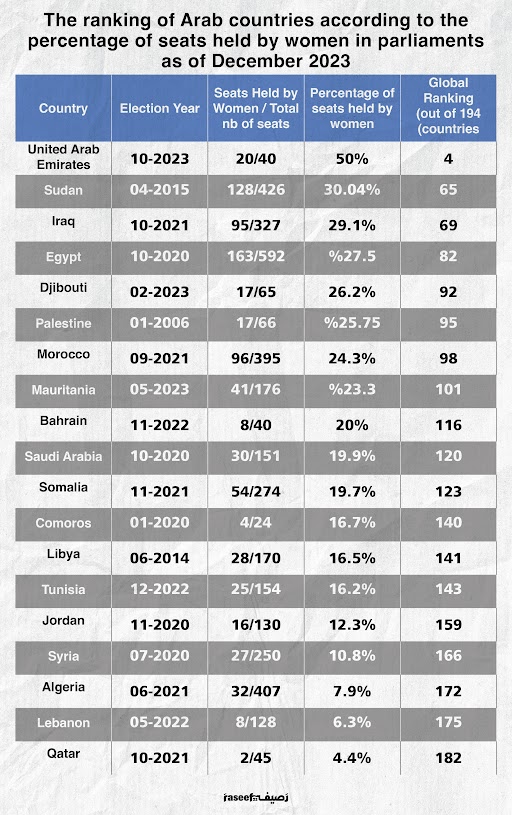
Despite a recent history of female leadership in some countries, notably in New Zealand and Germany, global political dynamics are largely male-dominated, with shy and limited participation by women. Although women’s rights have certainly improved, women still face significant challenges in accessing parliament across the world, with the representation of women in parliaments across the world not exceeding 26.5% in 2023.
In 1893, New Zealand became the first country to grant women the right to vote in parliamentary elections. In 1918, Britain followed, granting the right to vote to women over 30 years old, before lowering the voting age to 21 in 1928. During the 20th and 21st centuries, many countries implemented legal measures to ensure female political representation, as well as adopting policies encouraging increased female participation in political life.
But due to various cultural, social, and economic obstacles, women's representation in parliament has not increased equally or evenly across countries. A study conducted by the Inter-Parliamentary Union (IPU) on violence against women MPs indicates that the media sometimes deliberately "promotes and reinforces rumors as well as hateful and misogynistic behavior towards women." The study revealed that 27.3% of participating women parliamentarians faced challenges with traditional media outlets, which may publish demeaning images, derogatory comments, or sexually charged content. This percentage rose to 41.8% when asked about derogatory images or comments posted about female politicians on social media platforms.
Women’s movements for equality and rights bore fruit at the end of the 19th century and the beginning of the 20th, as some countries began granting women their political rights. However, due to various cultural, social, and economic obstacles, women's representation in parliaments has not increased equally or evenly across countries
In the Arab world, the United Nations Economic and Social Commission for Western Asia (ESCWA) identified five main obstacles preventing women from participating in political work: these are cultural, social, economic, institutional, psychological, and ideological. This study indicates that the low representation of women in Arab parliaments is due to the discouraging surrounding environment. The organization recommends implementing legal recommendations such as enacting a women's quota in parliamentary representation, as well as long-term social and economic recommendations to create a supportive general culture for women's entry into the political arena.
The quota system attempting to expand women's participation and presence in parliaments has collided with social and cultural constraints in some Arab societies, reducing its impact on changing the political landscape in Arab countries.
In 2023, the percentage of female representation in parliaments worldwide ranged between 0-61%. Out of 194 countries, female representation in parliament reached half or more in only six countries (Rwanda, Cuba, Andorra, Norway, Mexico, and the United Arab Emirates), while female representation in parliament remained nonexistent in some countries, such as Yemen.
The beginnings of women's representation in parliaments
In most countries worldwide, women did not obtain the right to vote and the right to stand for parliamentary elections at the same time. Additionally, in many countries, there was also a delay between women gaining the right to run in elections and actually entering parliament. In Libya, it took 48 years, in Lebanon, 39 years, and in Morocco, 30 years, between women being granted the right to stand for election and their entry into parliament. In Egypt, the gap was only one year.
In 1907, Finland became the first country in the world with female political representation in parliament, followed by Norway in 1911. In Arab countries, women began to enter parliament in the late 1950s.
The table below indicates that Egypt was the first Arab country where women gained parliamentary representation, in 1957, followed by Tunisia (1959, Algeria (1962), Lebanon (1963), and Sudan (1964).
 Year of first woman in parliament for each Arab country
Year of first woman in parliament for each Arab country
Countries with the highest female representation in legislative authority
According to the Inter-Parliamentary Union, the chart below shows the top 11 countries with the highest representation of women in their national parliaments as of 2023.
Rwanda has the highest percentage of female parliamentarians, with women holding 61.3% of seats in its house of representatives (49 of 80 seats). Cuba follows in second place, with 55.7% representation in its legislative body (262 of 470 seats), followed by Nicaragua with 51.7% (47 of 51 seats). The fourth position is shared by three countries where women occupy 50% of the seats in each of the Federal National Council in the United Arab Emirates, the House of Representatives in Mexico, and the legislative body in Andorra. Iceland ranks seventh, with 47.6%, followed by Costa Rica with 47.4%, and Sweden with 46.4%. Bolivia and Norway share the tenth position with a percentage of 46.2%.
From the list of the top eleven countries in women's parliamentary representation, the United Arab Emirates is the only Arab country on the list.
 The top 11 countries in terms of the largest percentage of seats held by women in national parliaments as of December 2023 (in the following order: Rwanda - Cuba - Nicaragua - United Arab Emirates - Mexico - Andorra - Iceland - Costa Rica - Sweden - Bolivia - Norway). Source: IPU – Monthly Ranking
The top 11 countries in terms of the largest percentage of seats held by women in national parliaments as of December 2023 (in the following order: Rwanda - Cuba - Nicaragua - United Arab Emirates - Mexico - Andorra - Iceland - Costa Rica - Sweden - Bolivia - Norway). Source: IPU – Monthly Ranking
The top 11 countries in terms of the largest percentage of seats held by women in national parliaments as of December 2023 (in the following order: Rwanda - Cuba - Nicaragua - United Arab Emirates - Mexico - Andorra - Iceland - Costa Rica - Sweden - Bolivia - Norway). Source: IPU – Monthly Ranking
Arab women and their representation rates in Arab parliaments
The United Arab Emirates stands out as a leader in the representation of women in parliament, ranking first in the Arab world and fourth globally with a percentage of 50% of women in the National Council, surpassing European countries in this ratio. This follows a decision by the UAE leadership to raise the percentage of women in parliament, while Human Rights Watch recommended improving the legal status of the women involved. Sudan ranks second in the Arab world with a percentage of 30.04% and 65th globally, followed by Iraq in third place in the Arab world with a percentage of 29.1% and 69th globally.
Could the low representation of women in Arab parliaments stem from the discouraging surrounding environment? The United Nations Economic and Social Commission for Western Asia recommends implementing a women's quota in parliamentary representation, as well as long-term social and economic recommendations to create a supportive general culture for women's entry into the political arena.
In this way, the UAE has surpassed many countries known for their rooted democracy and political equality. For example, France ranked 35th with a percentage of 37.8%, and England ranked 47th with a percentage of 34.6%. Interestingly, Sudan and Iraq have also surpassed the United States, which ranked 71st globally, with women's representation in the US Congress at 29%.
On the other hand, women's participation in parliament remains low in many Arab countries, such as Lebanon, Qatar, and Kuwait. In 2023, the representation of women in parliament was 6.3% in Lebanon, 4.40% in Qatar, 3.10% in Kuwait, and 2.3% in Oman. In Yemen, the doors to parliament are still closed to women, with no representation for them inside.
Despite the low percentage of women's representation in legislative authority in Arab countries, some positivity lies in the noticeable increase in this percentage by more than fourfold. Female political representation in the region rose from 3.8% in 2000 –the lowest in the world at the time– to 17.7% by the end of 2023.
 The ranking of Arab countries according to the percentage of seats held by women in parliaments as of December 2023
The ranking of Arab countries according to the percentage of seats held by women in parliaments as of December 2023
The effectiveness of women's role in political life
Regarding the presidency of parliament, women have broken men's monopoly on this position in 122 countries. Austria was the first country with a woman to occupy the position of parliamentary president in 1927, followed by Denmark in 1950, then Hungary and Uruguay in 1963.
The demand for women's access to parliament does not stem solely from the issue of equality, justice, and inclusivity in political representation, but also from the diversity in experiences and orientations towards legislative authority. Women's participation in politics is often linked to positive results in social and economic development.
In Arab countries, where women still face challenges entering political life and assuming leadership positions, women have chaired legislative councils in only three out of 22 countries in the last decade. These three women are: Amal Abdullah Al-Qubaisi in the United Arab Emirates in 2015, Hadiya Abbas in Syria in 2016, and Fawzia Zainal in Bahrain in 2018.
Ultimately, the demand for women's access to parliament does not stem solely from the issue of equality, justice, and inclusivity in political representation, but also from the diversity in experiences and orientations towards legislative authority. Women's participation in politics is often linked to positive results in social and economic development. When women participate in decision-making, societies tend to achieve improvements in education, health, and overall quality of life.
Raseef22 is a not for profit entity. Our focus is on quality journalism. Every contribution to the NasRaseef membership goes directly towards journalism production. We stand independent, not accepting corporate sponsorships, sponsored content or political funding.
Support our mission to keep Raseef22 available to all readers by clicking here!
Interested in writing with us? Check our pitch process here!



